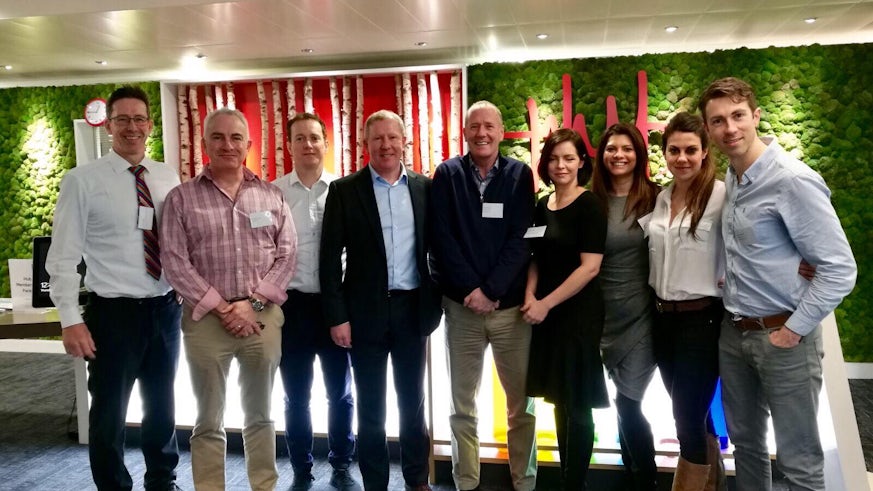Dealing with medical trauma through MedTRiM: best practice event
25 January 2017

Healthcare professionals from across the UK gathered at the Life Sciences Hub Wales in Cardiff Bay on the 12th January to learn about the innovative MedTRiM programme of trauma resilience in health care settings. The event was led by Dr Mark Stacey (Associate Dean for Innovation, Wales Deanery) and Mr Andy McCann (DNA Definitive) and attendees heard presentations about MedTRiM from other high profile speakers with backgrounds from the military to elite sport.
MedTRiM is a pro-active, peer delivered cognitive based resource for supporting those exposed to trauma and has been adapted by Mark and Andy from the trauma resilience training used by the military. Dr Stacey opened the event by explaining that medical linked work place trauma should be confronted like any other challenge, by developing the skills and mechanisms to overcome it and by learning “anti-fragility” processes which get stronger as they are tested.
The first speaker was Anaesthetics ST7 Jon Holland who spoke about fatigue in the health care sector. Jon’s own research that has found 77% of trainees surveyed have reported feeling too tired to drive home after a night shift and 29% have reported having nowhere they can take short rests at work during long shifts. Keeping active during night shifts and better shift patterning would help
improve patient safety and doctor well-being, though the background of NHS staffing and funding shortages limiting the ability of health workers to take down time to rest during long shifts is an ongoing challenge.
With medics working in high-stress environments, and stress leading to low morale and impacting performance, stress is an issue the Wales Deanery and others are seeking to address. Turning to medical students’, consultant psychiatrist Ceri Evans found they valued interaction with positive role models to de-stress during training, and she showed how people experience stress is very much dependent on the individual. To strengthen mental resilience Isra Hassan, ST 5 Anaesthetic Registrar, highlighted strategies for minimising anger and nurturing positive emotions by recognising the things we’re proud to have achieved each day.

Conflict in the workplace can be a significant contributor to low morale in the NHS. Laura Jackson, consultant anaesthetist, emphasised the need to “develop our emotions and how they relate to others” by taking the time to avoid conflict through building relationships, viewing colleagues as separate from the problem they may have just presented, listening before talking and choosing not to react to negative stimuli.
The keynote speaker was WO1 Miles Hall of the royal marines. Miles has served tours in Afghanistan, briefed parliamentary committees on combat stress and is a qualified TRiM manager, supporting military personnel coping with trauma. Miles’s message was that employers must look after the mental wellbeing of their staff following traumatic events. Organisations need to see their staff as having a “bank of emotional resilience” that can be depleted by trauma, but through training such as TRiM, can be replenished through support.
Performing under pressure is an expectation often placed upon medical staff, and Andy Halliday has spent many years working to prevent this expectation manifesting into psychological trauma as a Metropolitan Police firearms officer and a Team GB Olympics coach. In both professions TRiM has proved useful for mitigating stress and feelings of guilt.

Dr Katie Webb presented findings from CUREMeDE’s ongoing evaluation of the needs of healthcare professionals regarding mental resilience and of their feedback on past MedTRiM courses.
The event came to a close with speakers and attendees sharing their desire for doctors to be given the time to talk through stresses with their colleagues and for doctors to receive resilience training. Encouragingly directors of health boards have been getting on board with MedTRiM and the speakers expressed their hope that greater awareness of trauma in the medical workplace, and support for those affected, will increasingly be seen as a priority in the sector, to the benefit of staff and patients themselves.
You can join us for MedTRiM course across Wales in February and March:
- 27th February 2017 - MedTRiM, Cardiff REGISTER NOW
- 09th March 2017 - MedTRiM, Swansea. REGISTER NOW
- 17th March 2017 - MedTRiM, Rhyl REGISTER NOW
- 23rd March 2017 - MedTRiM, Bangor REGISTER NOW
For further information on MedTRiM or to register your interest in future courses please contact Elaine Russ.